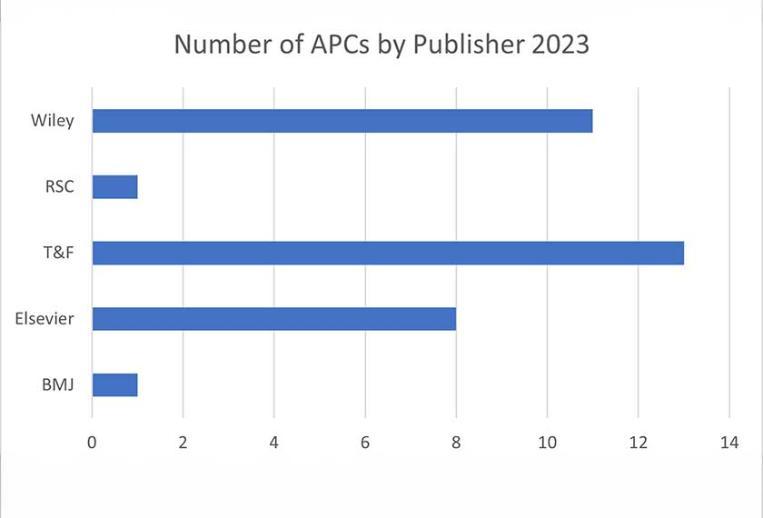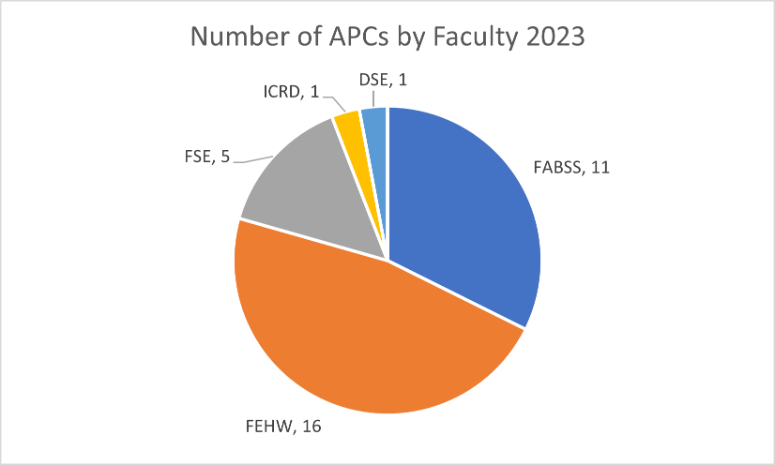Open access publishing and ‘read & publish’ deals

Open research is good for everyone and we should welcome more opportunities to publish our research open access. Read and publish deals (also known as ‘transformative agreements’) are contracts that have been negotiated between universities and publishers (in our case via JISC) that cover both the subscription to the journal (‘read’), and the cost of open access publishing (‘publish’). Over the last couple of years the University has subscribed to a number of these agreements which have enabled authors at the university to publish journal articles gold open access with no cost to themselves by covering the cost of article processing charges (APCs).
Whilst the university library started engaging with open access publishing pilots around 2017, a concerted effort to increase the open access options began in 2020 when the first deals with the Microbiology Society, Wiley, and the Royal Society of Chemistry were taken. The university now has deals with Elsevier, SAGE, Taylor & Francis, The Microbiology Society, Wiley, Royal Society of Chemistry, BMJ, and Cambridge University Press. Our most recent deal with SAGE began in January 2024.
How are Wolverhampton authors making use of the deals?
The data relating to the various agreements that we were signed up to during 2023 reveal some interesting insights into how researchers at the university have been engaging with open access publishing.
A total of 34 APCs were paid in 2023. These paid for open access in journals published by Elsevier, Taylor & Francis, Wiley, Royal Society of Chemistry, and BMJ. The most popular publishers this year have been Taylor & Francis, Wiley, and Elsevier with 13, 11 and 8 articles published respectively.

Data from Scopus shows that 4 out of the top 6 publishers whose journals our authors publish in are now covered by our read and publish deals in 2024 which is good news for our authors. Based on the number of corresponding authors (which is the prerequisite for qualifying for the payment of APCs under the agreements) the Scopus data suggests that there is the potential for more articles to be published under the agreements and for more of our research publications to be published open access this year.
| Publisher | No. of articles with WLV corresponding author |
|---|---|
|
MDPI |
32 |
|
Taylor & Francis |
29 |
|
Elsevier |
16 |
|
Wiley |
16 |
|
SAGE |
12 |
|
Springer |
12 |
Researchers from all faculties requested APCs. The majority of APCs were requested by researchers in FEHW (16) and FABSS (11). We don’t know why authors from these faculties have engaged more with the deals but subject coverage by journal publishers could be a factor in this.

29 different corresponding authors successfully applied for the payment of APCs for their articles. 14 authors from FEHW received APCs, 8 from FABSS, 5 FSE, and 1 each from ICRD and DSE.
The cost of APCs and licence choice
Individual APCs for research articles in hybrid/gold open access journals with the various publishers ranged from £1344 to £4032. In total the value of the APCs covered by all the deals totalled to just over £105,000 so the publish aspect of the read and publish deals has saved authors a not insignificant amount of money! Article types published under the deals included full length articles, research articles, brief reports and essays.
When it comes to licencing which specifies how others may re-use the content of articles, authors chose a variety of Creative Commons licences when making their articles open access. There was an equal split between the number of articles published under a CC-BY licence (the most permissive of the Creative Commons licences) and the CC-BY-NC-ND licence (the most restrictive). Whilst we can’t be sure of the reasons why authors choose particular licences, funder policies are likely to have an impact on licence choice.
Making the most of opportunities for publishing open access
It’s great to see that the number of APCs being requested by Wolverhampton authors under the read and publish deals is growing as awareness of publisher agreements spreads. We would encourage authors to check if one of our deals covers journals in their field when deciding where to publish.
The current deals that we have may not be available for ever (some publishers have mentioned limits on paying APCs depending on demand) so it’s important to take advantage of the opportunity to make your research available as immediate open access now. Information about the available deals can be found on the gold open access webpage here. If you have any questions about publishing under any of the deals please contact the Scholarly Communications Team at WIRE@wlv.ac.uk.
Unfortunately we don’t have deals with all publishers- this could be because for a number of reasons, for example some publishers might not currently offer a deal or the deal may be too expensive (this is a criticism often levelled at read and publish deals as they do exclude countries in the Global South and institutions that are not as well-resourced as others). Even though the library likes to consider all options to increase opportunities for staff and students to read and publish, there may be some that we cannot commit to simply because we do not have the budget.
Whilst publishing gold open access remains the standard that many strive for, it is not the only route to making research publications open. If there isn’t an opportunity to publish gold, remember that you can still make publications open access via the green route by depositing your research in our institutional repository.
Sarah Dar, Scholarly Communications Officer
Image credit: Photo by Thom Milkovic on Unsplash
For more information please contact the Corporate Communications Team.


/prod01/wlvacuk/media/departments/digital-content-and-communications/images-2024/240328-Varsity-Line-Up-Resized.jpg)
/prod01/wlvacuk/media/departments/digital-content-and-communications/images-18-19/220325-Engineers_teach_thumbail.jpg)
/prod01/wlvacuk/media/departments/digital-content-and-communications/images-2024/240515-Spencer-Jones-Award-Resized.jpg)
/prod01/wlvacuk/media/departments/digital-content-and-communications/images-2024/240229-The-Link-Resized.jpg)
/prod01/wlvacuk/media/departments/digital-content-and-communications/images-2024/240516-Andy-Gibson-Resized.jpg)